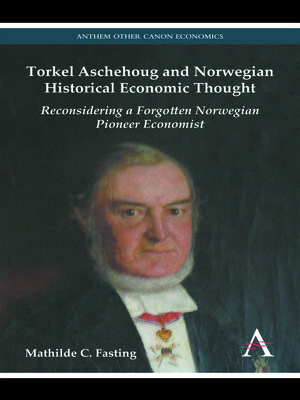Torkel Aschehoug and Norwegian Historical Economic Thought
ebook ∣ Reconsidering a Forgotten Norwegian Pioneer Economist · Anthem Other Canon Economics
By Mathilde C. Fasting

Sign up to save your library
With an OverDrive account, you can save your favorite libraries for at-a-glance information about availability. Find out more about OverDrive accounts.
Find this title in Libby, the library reading app by OverDrive.



Search for a digital library with this title
Title found at these libraries:
| Library Name | Distance |
|---|---|
| Loading... |
The historical schools of economics have been neglected within the arena of economic theory since the Second World War in favour of the now-dominant classical and neoclassical schools of economic thought. As alternative frameworks re-emerge, this book offers a revaluation of the legal theorist, economist and politician Torkel Aschehoug (1822–1909) and his historical-empirical approach to economics, a highly influential current in Norway during the last decades of the nineteenth century.
|The historical schools of economics have been neglected within the arena of economic theory since the Second World War in favour of the now-dominant classical and neoclassical schools of economic thought. 'Torkel Aschehoug and Norwegian Economic Thought' offers a revaluation of the historical-empirical approach to economics that the Norwegian legal theorist and politician Aschehoug became renowned for during the last decades of the nineteenth century up to his death in 1909.
Fasting approaches Aschehoug's economic thought in relation to his Norwegian colleagues, as well as the dominant international economists of the time. This comparison shows a theoretical affiliation with Gustav von Schmoller, in particular, through Aschehoug's major work 'Socialøkonomik', as well as British economist Alfred Marshall's marginal theory.
Fasting blends a historical account of the dominant economic models of the late 1800s with a review of contemporary theory through recent economic crises. This work argues that Aschehoug's 'Socialøkonomik' is strikingly relevant to a present-day readership, revealing itself as a work which offers real insight into the reasons for economic collapse.







